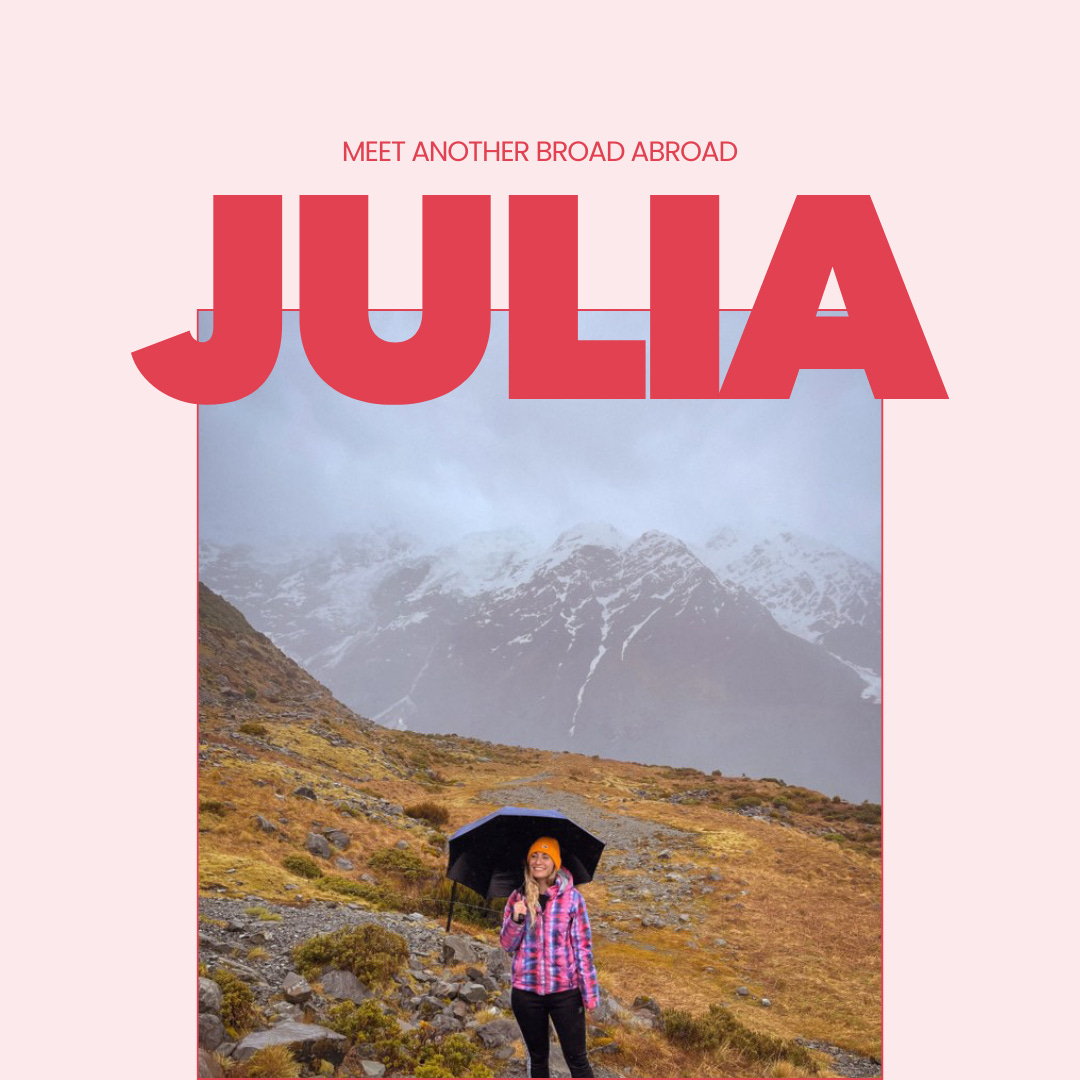003: An American girl's guide to moving abroad in 2025 ✈
+ FREE Move Abroad Checklist [Downloadable]
Is 2025 the year you move abroad? For many Americans, it just might be.
In the 24 hours after election day, Google searches for “move to Canada” surged by 1,270%. Searches for moving to New Zealand skyrocketed nearly 2,000%, while those for Australia jumped 820%.
And I can only imagine those numbers have climbed even higher since.
Every day, Americans turn on the news and watch— in horror—as a century of social progress gets overturned and the foundations of American democracy get debased with frightening efficiency.
What this means for America—and the world—is yet to be fully realised. It’s only been two weeks since Tr*mp’s inauguration, after all 🙃. My heart sincerely goes out to the groups who are feeling this the most: women, minorities, the LGBTQ+ community, immigrants, and the economically disadvantaged.
Having left America back in 2019, watching the country unravel from afar gives me a weird sense of survivor’s guilt. I got out. And part of me feels like it’s my duty to help others find their way out, too.
So if you’re an American looking for an exit— here’s me busting the emergency fire door open for you. Time to GTFO, bitch.
However, for many, the idea of moving abroad is daunting. I get it. Maybe you don’t know anyone who’s done it. Maybe you have no clue where to start. Well, lucky for you, my friend, you’ve got me - and this newsletter.
How to Actually Do It
I’ve broken down this article into two parts- the material and emotional- two halves of a whole abroad experience. The material is the physical and logistical barriers to moving abroad, while the emotional is the interpersonal and mindset shifts you need to see this decision through and finally pull the trigger in 2025.
Today, we’re tackling the material side— AKA the practical steps you need to take to make the move happen.
The Material Stuff
📄 Visas, Visas, Visas
Your visa is your golden ticket to the country of your dreams. And like Willy Wonka’s Chocolate Factory, you can’t just waltz into a new country. A visa determines whether you can stay, work, or study in a country. Here are the main types:
Tourist visa – Short-term stay for leisure or travel
Work visa – Allows employment in a country
Student visa – For school, training, or university programs
Working holiday visa – A dream option for young travelers, allowing you to stay for a year or more while working casually
Each visa has conditions—proof of funds, health checks, criminal record checks, etc.
💗 My advice: If you’re under 30, a Working Holiday Visa is the easiest way to move abroad. As a U.S. citizen, you can apply for WHVs in Australia, Ireland, Singapore, New Zealand, Canada, and South Korea.
✅ To do: Check the immigration website of your chosen country. Make a list of visa requirements (passport validity, financial proof, health records, etc.).
🏦 Finances
Full transparency: I moved to Australia with only $2,000 USD.
Would I recommend moving abroad with so little in the bank? No.
Is it possible to say YOLO and figure it out with what you have? Yes.
Though as your abroad bestie, take it from me: just because you can move abroad without a financial safety net, doesn’t mean you should (Don’t pull a 21-year old Juvi). Your first few months will be expensive—rent deposits, furniture, groceries, events, nights out. You want to enjoy your new country, not stress about scraping by.
💗 My advice: Save at least three months’ worth of expenses before moving. Factor in rent, food, transportation, and fun money. If you need to supercharge your savings, consider selling your items on FB market place!
✅ To do: Check visa financial requirements. Research living costs and create a three-month budget. Open an international-friendly bank account like Wise.
💼 Jobs
If you have a trust fund, you can probably skip this part. But if you’re like me (aka job-dependent), finding work abroad is a top priority.
You have two routes:
Find a job before you move
✅ Less financial stress, possible work sponsorship
❌ Harder to land a job without being in the countryFind a job after you move
✅ More options, better networking, unexpected opportunities
❌ Riskier & more stressful financially
Most expats (myself included) take the move first, figure it out later route. But if you’re in an in-demand field where sponsorship is likely, securing a job beforehand is ideal.
If you’re not in an in-demand field, consider these popular jobs for expats: English teaching, hospitality, retail, rural farm work, and digital freelancing.
💗 My advice: Get clear on your priorities and how transferable your skills are to your dream destination. Are you moving abroad for a career upgrade? Can your current skills land you a job in another country? If not, can you upskill? Or are you open to any opportunity that funds your new adventure?
✅ To do: Check job boards in your target country, such as Indeed, LinkedIn or Seek. Understand visa work restrictions. Start networking online.
🏠 Accommodation
Finding housing abroad can be tricky. Many landlords won’t lease unless you’re already in the country. Plus, you don’t want to commit to a new neighbourhood sight unseen.
My advise is to find temporary housing first. Book an Airbnb, hostel, hotel, or crash with a friend/ family while you look for something permanent.
To find a place:
Join local Facebook groups (many cities have flatmate-finding pages)
Use rental websites/apps like flatmates.com.au
Consider flat-sharing—less commitment, more social
💗 My advice: Start with a short-term stay and find a flatshare once you’re on the ground.
✅ To do: Join Facebook groups for your target city. Post asking about rentals. Explore flatmate-finder websites.
📌 Download my free checklist to get started on your move abroad!
Next Newsletter: The Emotional Side
Moving abroad isn’t just about logistics—it’s a mental and emotional shift, too. In the next issue, we’ll cover:
How to build community in a new country
Overcoming the fear of moving abroad
Vision boards, manifestation, and mindset work
Stay tuned for Part 2. 😉
🚨 New segment alert 🚨
I really want to spotlight other women on this journey because moving and living abroad can feel like such an isolating experience, especially for women. I aim to share holistic examples of stories from subscribers around the world who have made the leap and the beautiful, tough and unexpected experiences that come with it.
If you want to be featured in future newsletters, fill out the form here.
Where are you from? Brazil
Where do you live now? Auckland, NZ
What’s one thing living abroad has taught you about yourself?
The number one thing I have learned about living abroad is the importance of having the courage to live a life that is true to myself.
When I first moved abroad, no one (especially my family) understood what I was doing.
It is not very common for Brazilians to move abroad at a young age, and to top it up, I also dropped out of university and made a series of unusual choices that looked absolutely crazy to everyone else around me.
But I knew in my heart this was what I needed to do but open the paths for the life I had dreamed of. I needed to create this version of me that would be proud of herself, a version that chooses what feels right over comfort and/or fear.
With that kind of decision, a lot of willingness and resilience to make things work is also needed (and learned overtime).
Through a lot of hard work, sweat, and tears, I watched most of my dreams come true in the 10 years that followed that initial choice, and had a full circle moment with my family coming to visit and finally understanding and honouring my choices.
What’s the hardest part about being away from home?
Realising that times don't stop just because you are living your dreams, and that with your choices there is a high price to pay. Your parents get older, loved ones get married, grandparents pass away… Life goes on and you will not be there for most of it.
Sure, the technology does wonders but nothing beats a hug from people you love.
But the worst part is that your heart will be forever split in two (or more) places so, even if you returned home, you would then miss your chosen home on the other side of the world, and the friends and family you created there."
What’s the weirdest or funniest culture shock moment you’ve had?
The fact that people in NZ don't really wear shoes to a lot of places. I was blown away by this, and also how relaxed and care free the lifestyle generally is. That is miles apart from the culture I grew up with in a major city in Brazil!
👉 Follow Julia on IG @Juliamazze.
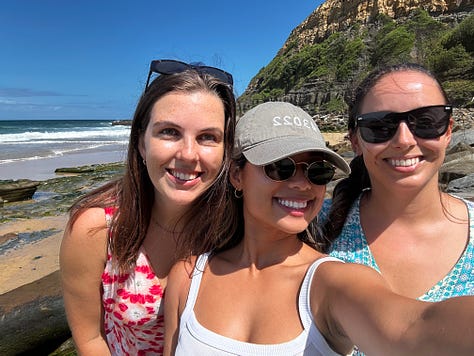
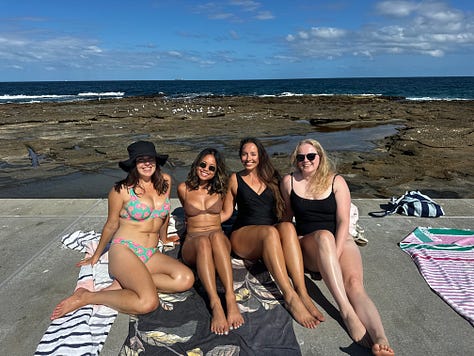
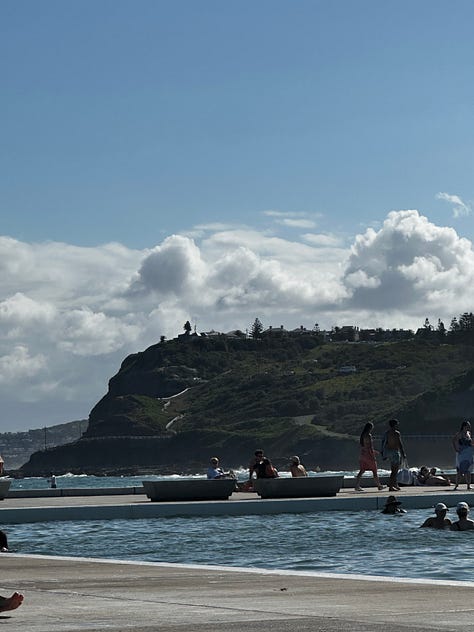
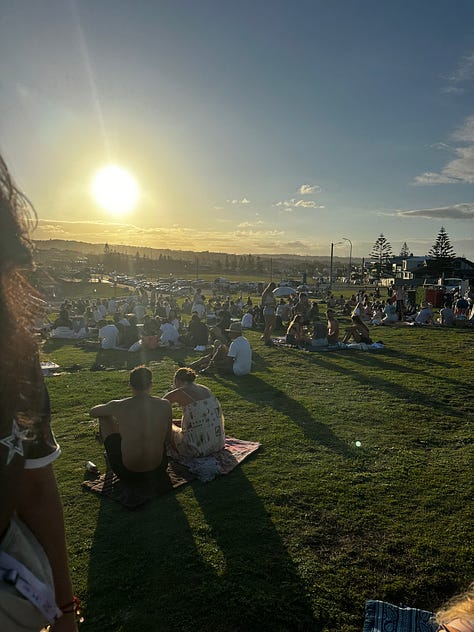
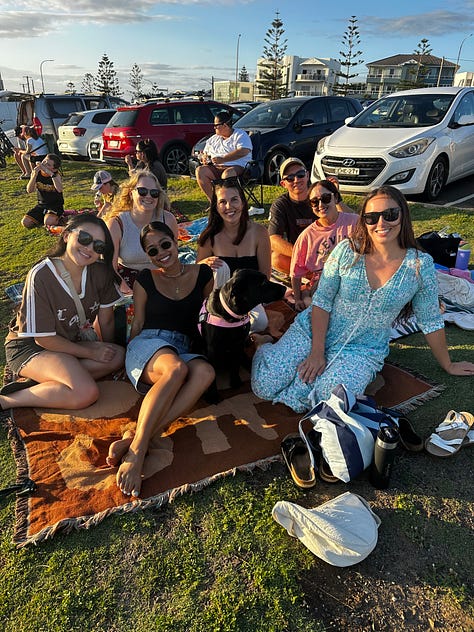
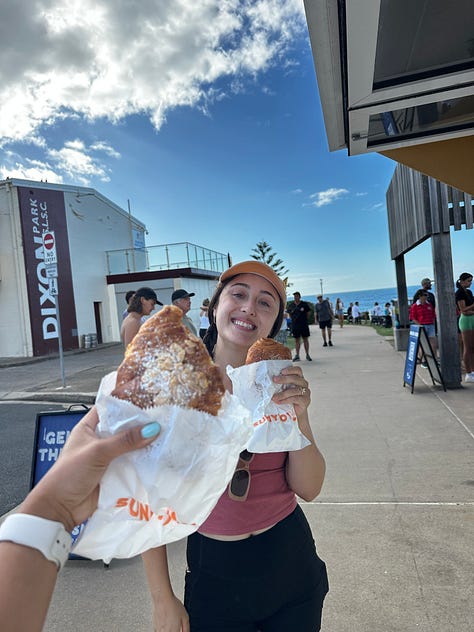
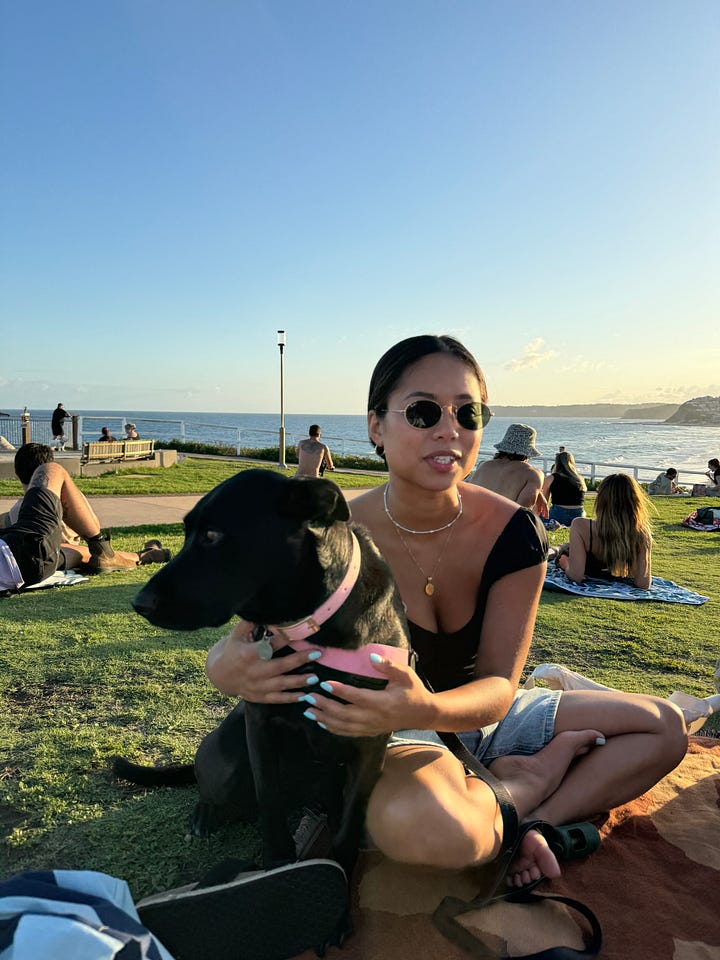
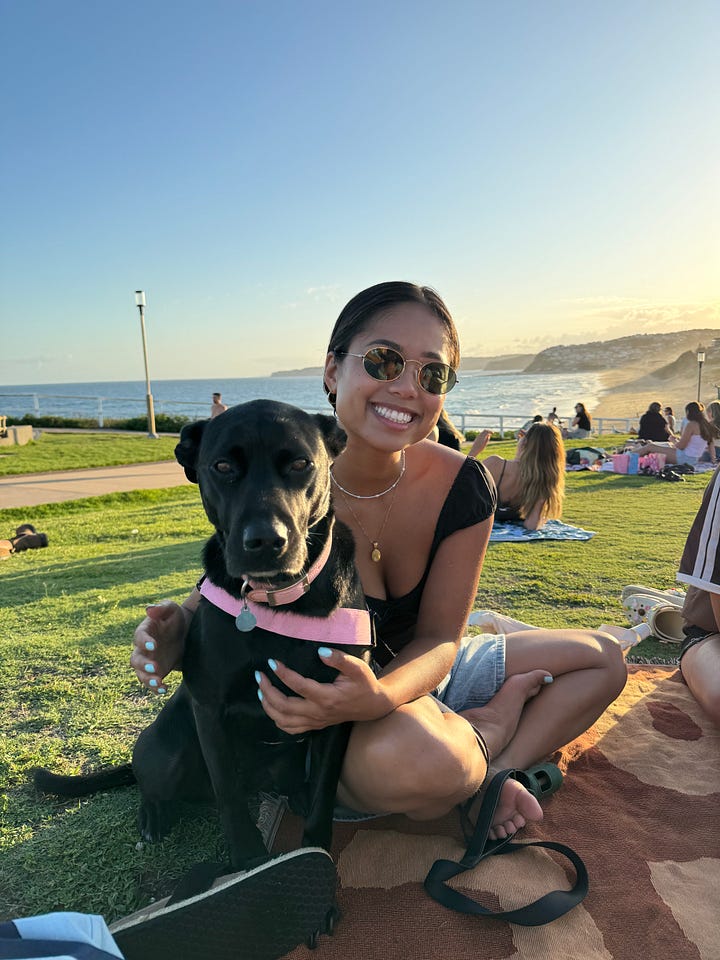
Currently in Sydney, Australia on an extended layover before flying to Bali on Saturday! Haven’t been back since I packed up my life here and moved in March 2024. Seeing family and friends these last few days has really filled my cup in ways I didn’t even know I needed.
Leaving Aus was one of the hardest experiences and, in many ways, I’m still grieving the life I left behind. I’m so fortunate to now live in New Zealand with my partner, but Australia, to me, is like a first love- I don’t think I’ll truly get over it. The impact this country has made on me is immeasurable, and there’s certainly no space left in this (already very long) newsletter to talk about it. Plus, I think I need a few more therapy sessions to really understand my feelings on it all. But yeah, I’m back. I love it. My soul is happy. My cup is full. 🩷
If you want to see real-time updates on my life, you can follow me on insta!
Guysssss, this newsletter has been a doozy to make! I truly hope you've gotten heaps of value from it. I’m creating something I wish I had when I first moved abroad 5 years ago. If there’s anything I can do to help you on your journey, just reply to this email—I’d love to chat!
If you enjoyed this newsletter, help us grow by sharing it with a friend who's dreaming of living abroad or already on their adventure. I’ll love you forever if you did! 🫶
Catchya next week. Muah!!
Juvi







